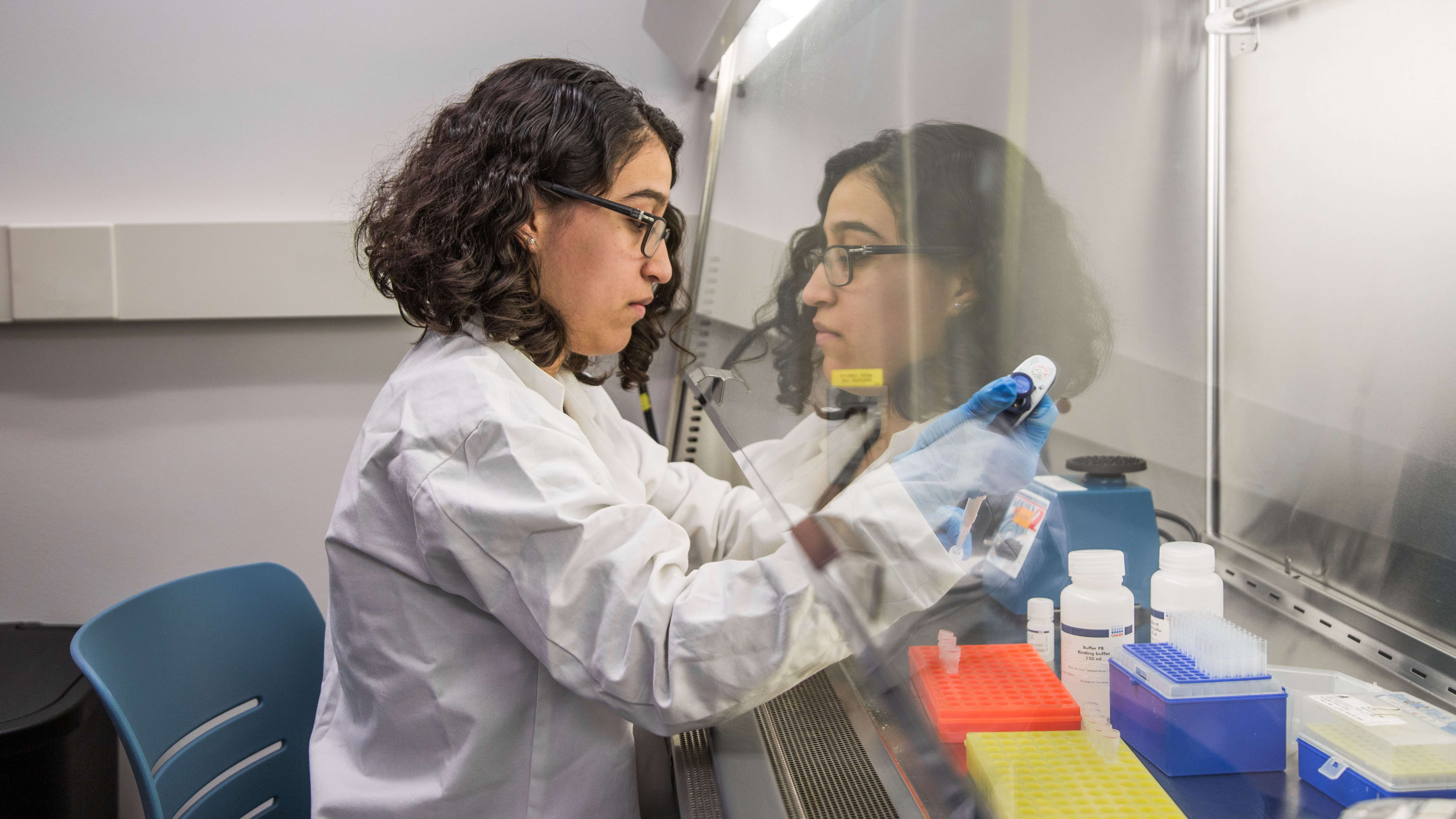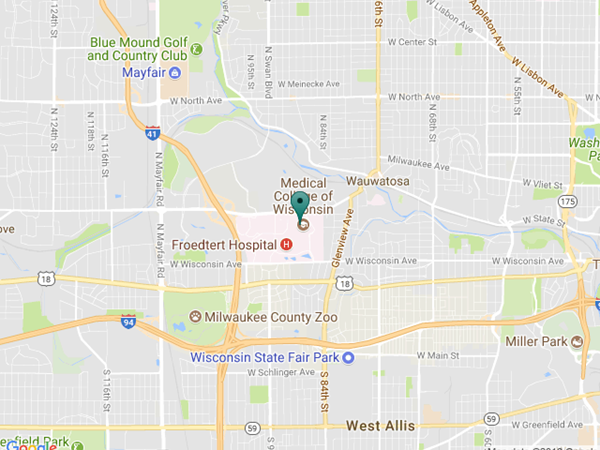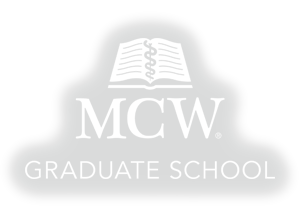Microbiology & Immunology PhD Program at the Medical College of Wisconsin

Message from the Director

Michelle Riehle, PhD
Assistant Professor of Microbiology & Immunology
Co-Director, Graduate Program in Microbiology & Immunology
mriehle@mcw.edu
(414) 955-8592

Vera Tarakanova, PhD
Professor of Microbiology & Immunology
Co-Director, Graduate Program in Microbiology & Immunology
vera@mcw.edu
(414) 955-7480
Microbiology & Immunology
About the Program
Mission of the Graduate Program in Microbiology & Immunology
The Graduate Program in Microbiology & Immunology (M&I) seeks to teach and train the next generation of research scientists in the molecular and cellular biology of bacterial pathogens, virus/host interactions, the innate and adaptive immune responses, animal and cellular model systems of infection and immunity, the microbiome, and the molecular mechanisms of gene expression, signal transduction, cell proliferation and cancer biology. It is the goal of the faculty and students to utilize classic and cutting-edge methodologies and technologies to conduct interdisciplinary research that will solve problems that are of significant biomedical importance.
Objectives of the Graduate Program in M&I
Through participation in a variety of departmental activities, M&I graduate students receive a broad education and training base that encompasses various aspects of biomedical science including those centered in the fields of bacteriology, immunology, virology, molecular biology, microbe-host interactions, genetics/gene expression and cancer biology. Our students develop essential technical skills and/or capabilities that allow them to conduct independent research, and effectively communicate scientific accomplishments in both written and oral forms. In general, M&I faculty seek to promote accomplishment of these objectives by providing a stimulating work and learning environment in which scientific curiosity is encouraged, scientific questions of significance are investigated, rigorous experimental approaches to problems are designed and executed, data is critically interpreted, and sound and cogent concepts are developed. The M&I Graduate Program assesses accomplishment of these objectives through several mechanisms including didactic course requirements, required annual research in progress (RIP) scientific presentations, semi-annual meetings with dissertation committee members coupled with submission of mentor summary statements, and dissertation-specific qualifying and defense examinations. The ultimate goal of the M&I Graduate Program is to produce well-rounded scientists that possess the necessary maturity, experience, and knowledge base to become independent leaders in the biomedical sciences within academia, industry, government, or other health-related career venues. These goals are consistent with the mission of the MCW Graduate School and of the Medical College of Wisconsin as a whole.
Curriculum
Curriculum details to come...
Course Summary
25-210 Principals in Laboratory Animal Science - 1 credit
A one-credit hour course surveying the issues fundamental to the successful use and care of animals in biomedical research. Students will gain knowledge of an array of core topics in laboratory animal science, including: understanding and navigating ethical and regulatory frameworks in which animal research occurs; basic biology and care of common laboratory species; managing rodent breeding colonies; contemporary issues in laboratory rodent genetics; important sources of non-experimental variables in animals research, including nutrition, microbial status, and pain; strategies for minimizing pain and distress in animal subjects; and basic techniques in laboratory rodent handling and restraint.
25-230 Current Topics in Microbiology and Immunology - 3 credits
This advanced course consists of introductory lectures on a selected topic followed by in-depth discussions of original research articles on topics such as bacterial invasion, virulence factors, immune evasion, virus-host interactions, T-cell functions, and viral regulatory proteins.
25-234 Cellular and Molecular Immunology - 3 credits
This course is an introduction to the experimental basis of immunology through readings from texts and current immunological journals. Topics covered include the cellular basis of the immune response, antigens, antibodies, and molecular basis for generation of immunologic diversity, and regulation of the immune response.
25-236 Cellular Microbiology - 3 credits
Cellular Microbiology is designed for students who are interested in contemporary concepts of cellular microbiology and microbial/viral pathogenesis. We will emphasize host/pathogen relationships and illustrate how the study of bacteria and viruses has provided insight into the molecular and cell biology of many eukaryotic processes. This is by no means a classical microbiology course or a classical cell biology course, and does not provide a survey of microorganisms. Rather, students will gain an appreciation of the basic properties of bacterial and viral pathogens, the processes leading to acute and chronic infections, the strategies that these agents utilize to enter and traffic through cells and exploit host cell processes for regulated gene expression, and technical approaches to pathogen study. Faculty will present formal lectures and engage students in numerous paper presentations/discussions. Students will be expected to acquire substantial background information in out-of-class readings.
25-251 Advanced Molecular Genetics - 3 credits
The goal of the course is to introduce students to current concepts in cancer biology, explore original research articles that form the basis of our current understanding of cancer, and provide students with experience in the critical evaluation of original cancer research. The course will consist of introductory sessions to place the course in context, followed by in-depth critical analysis and discussion of research articles relating to the topic being addressed. The introductory lectures within each unit will provide background information and establish a framework for the discussion of the research articles. Chapters from Weinberg's "The Biology of Cancer" or reviews will augment the readings. Following an introduction to a topic by each instructor, the topic will be explored by discussion of original research articles that have contributed to our understanding of that topic. Papers will be posted on D2L as PDF files. Each student is expected to have read and studied assigned articles in depth prior to class and to participate actively in meaningful discussions. For each paper discussion session, students will be placed into teams with assigned responsibilities for setting up the background and hypotheses behind the papers, the experimental approaches and findings, and the discussion of what has or should be done to extend the work presented. The discussion sessions will require active student participation. In sum, the lectures and discussion sessions will provide students with a contemporary understanding of the fundamental biological processes involved in the initiation and progression of cancer. Moreover, the students will become familiar with the most important questions in cancer research today and the experimental approaches that can be brought to bear on these questions. Prerequisites: There are no formal prerequisites, although students will be expected to have a firm understanding of molecular and cell biology, classical and molecular genetics, signaling, and techniques commonly used in these disciplines.
25-259 Mucosal Immunity - 1 credit
Gastrointestinal diseases are among the most common and least understood human health problems. Intestinal epithelial cells act as a dynamic interface between the external and internal environments and are polarized into an apical and basolateral domain. The primary functions of these cells are to maintain barrier integrity via tight-junctions with neighboring cells and function in absorption and secretion. Epithelial cell polarity is reflected by distinct protein localization. Those in the apical compartment are specialized for nutrient absorption and ion secretion. Basolateral localized proteins are specialized for maintenance of the electrochemical gradient and adherence to neighboring cells and the subjacent extracellular matrix. Intestinal epithelial cells are key participants in the mucosal immune response and maintain chronic physiologic inflammation characteristic of the intestinal mucosa. In response to pathogen infection or inflammatory stimuli, epithelial cells upregulate the expression of proinflammatory cytokines, antimicrobial peptides and chemokines and are a likely cause of pathologic inflammation in numerous gastrointestinal disorders. The primary objective for this course is to provide advanced information and conceptual knowledge regarding the mucosal immune system in health and disease.
25-260 Mucosal Pathogenesis - 1 credit
Mucosal Pathogenesis is an upper-level, 1-credit hour M&I course that focuses on the interactions of microbial pathogens with cells of the mucosal epithelium. Students will gain a detailed and comprehensive understanding of specific infectious microbial pathogens, and the mechanisms utilized by these microorganisms to associate, invade, and/or cause disease at the mucosal surface. Microorganisms to be discussed include those that target that respiratory tract, the gastrointestinal tract, and the genital/urinary tract. The course will comprise a combination of formal lectures by instructors, group discussions of scientific papers from the recent literature, and activity-based learning sessions including grant critique, manuscript review, and assigned topic presentations. Student participation in these activities will comprise 50% of the final grade. The remaining 50% will be based on performance of take home assignments associated with individual 2-week blocks.
25-261 Bacterial Toxin-Mucosal Cell Interactions - 1 credit
Bacterial Toxin-Mucosal Cell Interactions is a 1 credit hour upper-level M&I course that addresses the interactions between bacterial toxins and mucosal cells. The goal of this course is to provide students an appreciation of how bacterial toxins that target mucosal cells function as virulence factors and utilized as vaccines and for the development of clinical therapies. The course format includes formal lectures and paper discussions. The course will meet for 6 weeks during the third block of the fall semester (weeks 13-18). Cellular and Molecular Immunology (25-234) or Cellular Microbiology (25-236) are a prerequisite for this course.
25-262 Tumor Immunology - 1 credit
Tumor Immunology is an upper-level, 1-credit hour M&I course that will focus on the interactions of tumor cells with various components of the immune system. These interactions are complex, and immune-based strategies for treating cancer have had limited success in the clinic. This course will examine the following: (a) How the immune recognizes tumor cells as “foreign”, (b) Immune strategies for targeting cancer, (c) Barriers to achieving effective tumor immunity, (d) Monitoring the immune response to cancer, and (e) Use of animal models to study the interactions between tumor cells and the immune system. The goals of the course will be to gain an in-depth understanding of the complex interactions between tumor cells and the immune system, and to learn how animal models can be used to better understand these interactions. While the course will be heavily weighted towards the discussion of important papers in the field of Tumor Immunology, it will also involve didactic lectures. Students will be evaluated through attendance and participation (30% of final grade) and a final exam (70% of final grade). The course will meet twice a week for a total of 6 weeks.
25-263 Signaling in the Immune - 1 credit
Signaling in the Immune System is an advanced topic immunology course that focuses on different aspects of cell signaling and how these shape the immune response. Students will learn, in detail, how different immune cell types utilize distinct cell-surface or intracellular receptors to regulate their activity or differentiation state. The course will be divided into formal lectures by instructors introducing different topics, followed by a group discussion of scientific papers in that field.
25-264 Developmental Immunology - 1 credit
Upper-level 1 credit hour M&I course that focuses on the key molecular mechanisms regulating myeloid and lymphocyte maturation and adaptive immunity. Students will gain a detailed understanding of T and B cell development and antigen receptor repertoire selection.
Key processes covered during formal lectures:
1. Commitment of progenitor cells to the myeloid and lymphocyte lineages
2. Rearrangement of antigen receptor genes
3. Selection events that shape the antigen receptor repertoire
4. Proliferation of progenitors
5. Differentiation into functionally and phenotypically distinct lymphocyte subpopulations.
Key themes linking the material:
1. Transcription factors in immunology: shared factors – different roles
2. Cytokines and growth factors drive functional diversification
3. Lineage “commitment” preserves lineage flexibility
4. Distinctions between steady state homeostasis and immune responses
5. Distinctions between mice and humans
In addition to formal lectures by the instructors, the course will feature group discussions of seminal papers that have shaped current thinking in the field. Students will be evaluated by their participation during group discussion and by a single take-home final examination. The course will meet twice weekly for 6 weeks.
25-265 Immunological Tolerance - 1 credit
Immunological tolerance is defined as unresponsiveness to an antigen that is induced by previous exposure to that antigen. Tolerance to self-antigens, also called self-tolerance, is a fundamental property of a healthy immune system that is maintained by multiple overlapping mechanisms. Failure of self-tolerance results in autoimmune diseases that can affect every organ system of the human body. Conversely, the induction of self-tolerance may also be exploited for therapeutic purposes. In this mini-course, we will consider the general features and mechanisms of self-tolerance in T cells and B cells. These mechanisms include (1) anergy, (2) deletion by apoptosis, and (3) suppression by regulatory T cells. In addition, this course will consider select models of autoimmunity that have proven to be effective tools in our effort to understand tolerance as a complex biological process. The mechanisms of immunological tolerance constitute essential knowledge for all students training in Immunology.
In addition to formal lectures by the instructors, the course will feature group discussions of seminal papers that have shaped current thinking in the field. Students will be evaluated by their participation during group discussion and by a single take-home final examination. The course will meet twice weekly for 6 weeks.
25-266 Clinical Immunology - 1 credit
Clinical Immunology is an upper-level, 1-credit hour M&I course that will provide advanced information and conceptual knowledge regarding the human immune system in health and disease. The information presented in this course will: provide the student with a knowledge of general and specific tests to evaluate specific components of human immune function, lead to a fundamental understanding of diseases caused by primary or secondary abnormalities in immune function, provide a basic understanding of histocompatibility antigens in human disease and their role in bone marrow transplantation, provide knowledge of autoimmunity (systemic autoimmunity, autoimmune diseases of skin and the gastrointestinal tract), provide a fundamental knowledge of atopic diseases. We will also explore present and future therapies for disorders of immune function.
25-269 Advanced Bacterial Physiology - 1 credit
Advanced Bacterial Physiology is 1-credit hour M&I course that focuses on fundamental and diverse aspects of bacterial physiology. Students will gain an understanding of the mechanisms bacteria use to execute, coordinate, and control basic cellular processes such as macromolecular synthesis, nutrient utilization and metabolism, signal transduction, and stress responses. The course focuses on critical evaluation and discussion of papers from the primary literature. These discussions will be augmented by short didactic presentations of background material by the instructor to place the paper’s topic and findings in context.
25-270 Advanced Virology - 3 credits
Concepts in virology are illustrated by selected appropriate model systems of animal viruses. Topics include viral replication, genetics, antivirals, and virus-host interactions.
25-271 Membranes and Organelles - 1 credit
Membranes and Organelles is an upper-level, 1-credit hour cell biology course that focuses on the topics of membrane protein trafficking and membrane biogenesis. Students will gain a detailed understanding of organelles and membrane protein trafficking and degradation, membrane vesicle fusion, secretion, and membrane biogenesis. The course will consist in part of readings of seminal papers describing the genetic screens done in yeast for secretion (sec), vacuolar protein sorting (vps) mutants, and autophagy (atg), as well as the Rothman in vitro vesicle fusion experiments. These experiments provide the first description of the proteins we know today to be involved in membrane protein fusion, secretion, and trafficking, and emphasize the power of yeast genetics. After grounding in the design and outcome of these historic screens, the class will focus on what is known today about the proteins identified in the original ground-breaking screens. The newer areas of membrane biology – the formation of lipid droplets and formation of autophagosomes – will follow similar format – the first session examining the discovery and formation of paradigm, and the second session delving into what is known today. Students will be evaluated by participation in paper discussion (40%) and a final take-home exam (60%). The course will meet twice a week for 6 weeks.
25-280 Classical Papers in Microbiology and Immunology - 1 credit
Classical Papers in Microbiology and Immunology (M&I) is a course suitable for all students in the Microbiology and Immunology graduate program. Through this course, instructors and students will review, discuss, and critique notable papers from the last century that have made seminal contributions to the fields of molecular biology, bacteriology, virology, immunology, biochemistry, and/or genetics. The impact of these contributions in the present day will also be discussed. In addition to instructor-identified papers, students will also choose and formally present a recent paper for discussion that they feel has made a substantive contribution to the biomedical sciences. Papers to be discussed are expected to vary between semesters depending on topic of discussion and instructor(s) facilitating the discussion. Ultimately, this course is expected to provide students with an expanded knowledge base of seminal papers in the broad fields of microbiology and immunology.
25-289 Career Internships in the Biomedical Sciences - 0 credit
Career Internships in the Biomedical Sciences is a 0-credit training course that will provide students in the Graduate Program in Microbiology and Immunology with an opportunity to complete a semester-long internship in a biomedical science career outside the postdoc-faculty pathway. Currently, this new course is being developed with three internship modules (Teaching, Clinical Microbiology, and Research Core Management); however, it is expected that new internship opportunities will be developed in the future to address additional student interests. Each internship has been developed such that students will gain direct hands-on experience in the career opportunity. Each internship also includes extensive opportunity for one-on-one mentoring with individuals experienced in that career pathway (i.e. site directors, course directors, research core managers, etc.). As part of each internship, students are required to complete a “scholarly activity” that will employ the use of information and/or techniques that have been acquired during the training period. Finally, site directors and/or other participants active in the student’s training during the internship will complete evaluations providing the student with feedback regarding their performance during the internship.
25-290 Career Development Training in the Biomedical Sciences – 1 credit
The purpose of this course is to introduce students to the skills needed to identify and prepare for career opportunities following graduation from MCW. The course will meet for 2 hours each work during the summer with the goal of helping students develop key documents and/or skill sets to facilitate future career planning including career assessment, career goal setting, career exploration and networking, job search strategies, building resume/CV, writing statements, interview skills, and negotiating job offers. Individual sessions will include a lecture by one of the Course Directors or an invited instructor experienced in the topic to be discussed. Within each session, students will also be split into small groups to facilitate interactions, and allow review and assessment of specific assigned activities. At the end of the course, students will have completed a series of individual assignments that will culminate in development of an individual career plan and career portfolio.
25-298 Immunology Journal Club - 1 credit
The purpose of this course is to learn, evaluate and present cutting edge immunological research topics from leading journals to gain knowledge of new immunological findings and to stay current with emerging technologies. Students will attend and present in a weekly independently organized immunology journal club. During the semester, students will be required to attend the journal club and write a short paragraph after each presentation regarding what they learned. This should include: The knowledge gap being addressed, the hypothesis being tested, strengths and weaknesses of the study and resulting conclusions. If a journal club is not scheduled for a particular week, the students will be required to attend an independently organized immunology work-in-progress series. For the students’ presentations, students will select a research paper of immunological focus from a list of preapproved journals. While the student can choose any topic of interest, the selection will require approval from the course director. The presentation will consist of a PowerPoint style presentation including the following information: Why the student selected the article, the knowledge gap being addressed, background information supporting the hypothesis, the hypothesis being tested, discussion of the approaches and experimental data, strengths and weaknesses of the study and conclusions including potential future directions. Ultimately, this course is expected to provide students with an expanded knowledge base of current topics in the broad field of immunology.
25-300A Graduate Seminar - 1 credit
In this course, students are trained to organize and present a scientific seminar. Students identify an area of interest and select one to several reports from the literature on which to base the seminar. Students are instructed on how to develop an effective introduction, how to progress through the description of scientific questions, how to effectively present data figures and conclusions, and how to logically tie the data and conclusions together into a coherent and compelling story. Students are required to meet periodically with the course director prior to their seminar to decide on the seminar topic, to discuss PowerPoint slides, and to conduct practice seminars. A video camera will be available for those students wishing to have their seminar videotaped. Students will meet with the course director following their seminar to discuss audience comments, recommendations for improvements, and prepare critiques from other seminar activities. Students will also attend and prepare written critiques of selected departmental seminars from invited outside speakers, and from students and faculty presenting their Research in Progress (RIP). The class will meeting two times during the semester following these seminars to discuss strengths and weakness of the seminars. Students in the Department of Microbiology & Immunology are required to enroll and complete the seminar course at least once as part of their departmental core curriculum. The class will be limited to four students per semester and priority given to third year students. Students receiving a grade lower than an A- on their first offering must take a second semester of seminar to complete the requirement.
Admissions
Degree Offered
The M&I Graduate Program offers a Doctor of Philosophy (PhD).
Program Admission Requirements
Those interested in pursuing education and research within the Department of Microbiology & Immunology should pursue admission through the Interdisciplinary Program in Biomedical Sciences (IDP), the Neuroscience Doctoral Program (NDP), the Medical Scientist Training Program (MD/PhD), or direct admission into the Microbiology & Immunology program.
A Bachelor’s degree (either completed or in the process of completing) is required for admission to any MCW graduate program. Applicants will ideally have a 3.0 or higher grade point average (GPA). Personal statements and letters of recommendation from professors, advisors, research supervisors, etc. who know you well are highly regarded in the admission process. Prior research experience is also strongly considered.
Applications accepted by the priority application deadline of December 5th will receive first priority for admission the following Fall. Students are admitted once per year.
Tuition and Fees
If you have questions regarding tuition or your account, please contact the Office of Student Accounts, at (414) 955-8172 or mcwtuition@mcw.edu. Please refer to the All Student Handbook (PDF) for tuition payment policies and information.
PhD Students
All full-time PhD degree-seeking students in good academic and professional standing receive the following financial support package:
- Full tuition coverage
- Yearly stipend ($36,355 for 2025-2026 academic year)
- Complimentary health insurance
There is no additional process to secure this package aside from accepting an offer of admission. Further, this package is guaranteed from the time of enrollment through completion of degree requirements.
Current MCW Employees
Tuition Course Approval Form - Human Resources (PDF)
Late Fees
There is a $250 late payment fee for tuition not paid on time according to the Tuition Payments policy in the All Student Handbook.
Faculty
Documents
Graduate Program Student Information
Graduate School Forms
Please refer to the Graduate School student forms page for more information.
Follow Us On Our Socials
Stay up-to-date on events, news, and other happenings in the MCW Graduate School!



